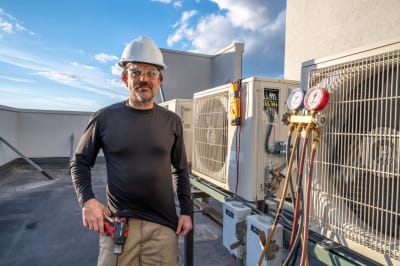The article below explores the process of becoming a plumber in Virginia. Naturally, candidates looking to embark upon this journey have a much better chance of success if they understand what to look for right from the start.
And that is exactly what we seek to provide in the upcoming sections. We start by providing a clear picture of the step-by-step requirements to become a plumber in Virginia before moving to the certification options and the possible licensure requirements.
Then, we break down the top programs in the state offering world-class plumbing training. Lastly, candidates will also discover possible salary ranges they may fall into and the factors that can help them increase their earnings even further.
How to Become a Plumber in Virginia
Below are the steps required to start a plumbing career in Virginia.
Step 1 Basic Requirements
The basic requirement to become a plumber in Virginia is simple — be at least 18 years old. From here, candidates may move on to the next step, acquiring classroom and real-world training from approved training programs.
Step 2A: Academic Program
Plumbers in Virginia often begin their careers by attending a community college, trade school, or technical institute. This is the academic route, and it offers several advantages.
Graduating from academic plumbing helps candidates obtain valuable certificates and degrees that make employment and continuing education easier. Additionally, academic programs may leverage their connections to help with job placement assistance.
Some of these programs can be completed in as early as 6 months.
Step 2B: Apprenticeship Program
Candidates may also go through the apprenticeship route. As expected, all apprenticeship programs must be approved by the state for their training to be valid. The most popular options are those organized by trade unions and professional organizations in the state.
Even though it is possible to obtain a level of classroom instruction and hands-on training from both academic and apprenticeship programs, it is common for candidates to combine both approaches for the most comprehensive results.
Step 3: Certification
Lastly, even though it is not compulsory, plumbers in Virginia may seek professional certification to enjoy professional benefits. They may do this before or after licensure. We discuss more on the topic below.
Consider exploring trades with similar paths:
Top Plumbing Schools in Virginia
The following are some of the top plumbing schools in Virginia.
Virginia Technical Institute
Campbell , VA Online + Campus
Virginia Technical Institute - Offers a strong plumbing training program with classroom and hands-on training opportunities. The program boasts a high job placement rate for graduates.
Tuition
$700 - $1,400 per SemesterContact
(434) 369-8200
askvt@vt.edu
Virginia Technical Academy
Newport News, VA Online + Campus
Virginia Technical Academy - Offers a solid training program for future plumbers, such as the one at Virginia Technical Institute.
Tuition
$8,990 - $9,032 per SemesterContact
(757) 586-5322
admission@vtacademy.com
ABC Virginia
Richmond, VA Campus Only
ABC Virginia - The Associated Builders and Contractors offers strong hands-on training with opportunities for mentorship and job placement assistance.
Tuition
FREEContact
(804) 213-4400
ABC-PST@virginiaabc.com
Explore Plumbing Schools by City:
Licensure & Certification Requirements
The Department of Professional and Occupational Regulation is responsible for issuing licenses to plumbers in Virginia. Yes, all professional plumbers in the state are expected to be licensed to work legally.
There are three levels of plumbing licenses in the state: journeyman license, master license, and contractor license.
To obtain a journeyman license, candidates must pass the abovementioned steps and submit an official application. To obtain a master’s license, candidates must have practiced for at least a year as a journeyman plumber in Virginia.
The contractor license is divided into three classes: Class A, Class B, and Class C. The class A license has no restrictions, while holders of the class B license are restricted to projects worth no more than $120,000 at a go and no more than $750,000 for the year.
The class C license restricts holders to less than $10,000 at a go and most $150,000 for the year.
Salary & Career Outlook
The salary of plumbers in Virginia can be divided into three broad categories - the average earners in the state, the lowest earners in the state (bottom 10%), and the top earners in the state (top 10%). Survey shows that while the average plumber in Virginia makes roughly $68,684 yearly, those in the top 10% take home an annual average salary of $135,417, while those among the bottom 10% take home an annual average salary of $34,837.
Experience and place of work are among the most important factors determining how much a Virginia plumber will take home at the end of the year. Location also plays a huge role, with Manassas and Warrenton being the cities with the highest pay for plumbers in Virginia. Professionals here take home annual average salaries of $133,598 and $90,502. Those in Lexington and Norfolk follow with annual average salaries of $64,351 and $62,958 respectively.
Rounding up the top five are plumbers in Alexandria, taking home an annual average salary of $62,390.





